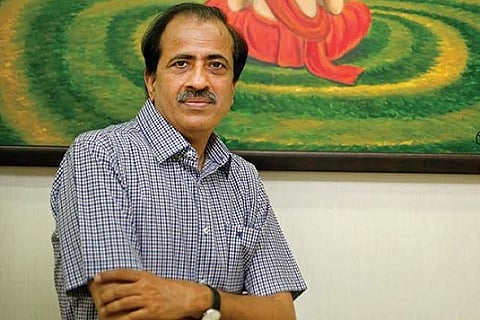
- News Updates
- PSU Watch
- Defence News
- Policy Watch
- हिन्दी न्यूज़
- Jobs Watch
- States News
- Event News

New Delhi: It's been over a month since the lockdown to contain the spread of Coronavirus was placed on the entire country and netizens have heralded the beginning of a trend on social media to showcase their productivity. Over the course of the Coronavirus lockdown, people have rediscovered their childhood hobbies or found new ones, men have discovered cooking (pun intended), others have found their own ways of keeping themselves at home and staying motivated. However, this retired IAS officer has penned down and published his fourth book.
Sharing the news on Twitter, Balvinder Kumar, a 1981-batch IAS officer (Retd) of Uttar Pradesh cadre who is currently serving as Member of RERA (Real Estate Regulatory Authority), UP, said, "Taking the advantage of lock-down, I have written eBook, in which I have pen down my "thoughts about life" — its complexities and how we can overcome and succeed in our journey." The title of the book is Explore your Life Journey.
Apart from the RERA office (after the lockdown is lifted), Kumar can be found on www.balvinder.org, where he pens his thoughts on subjects that has caught the fancy of philosophers since time immemorial. He describes himself an author and a spiritual seeker, who has been sharing his thoughts on various aspects of life, science and spirituality. His writings explore a whole gamut of subjects concerning our life and its spiritual nature, also focusing on how to master our life in contemporary world.
His writings are greatly influenced not only by recent findings of neuroscientists and medical researchers but also by the teachings of the Buddhist tradition, Vedic philosophy and the inspirations of contemporary spiritual teachers. He himself is a regular practitioner of yoga and mindfulness-based meditation.
The book opens with a chapter on human destiny in making and explores the predicament of humanity as it stands on a vulnerable junction. Then it goes on to explore the spiritual and philosophical aspects of life's journey and its paradoxes and challenges, followed by a deep meditation on how to overcome them. And then it closes with beautiful note on how to age and die peacefully.
The essence of spirituality is to know our true selves and to discover the real meaning and purpose of our life. The self we know, the individual ego, is a limited representation of our identity. Since we are largely ignorant of our true selves, we derive a false sense of identity from what we feel about ourselves, and how others see us.
Interestingly, millennials (individuals born between 1981 and 1996) who tend to be passionate about their careers, fitness, and the climate crisis, but not interested in religion. For many of them, the gym or a beautiful park is their temple. This is how there is a shift towards spirituality from religion.
Both good and evil are deeply ingrained in the collective human mind. Are we, as many believe, fundamentally good, but somehow our goodness is contaminated by evilness? Or have we an inherent tendency toward being evil, which is overshadowed by goodness?
From the vast input from the world around us, only a small fraction of it is consciously processed by our minds. Then, from our selective filter of past experiences, beliefs, mental conditioning, and other fixed ideas, we construct reality in our own unique ways.
Seneca once said, "We suffer more often in imagination than in reality." Because all too often, we tend to worry about circumstances that we can't control, and often end up overthinking every situation to a point where we become paralysed by fear.
